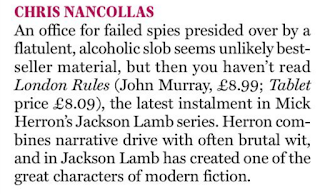While I am interested in Irish history, I'm only a casual observer of Northern Ireland. Much of what I know about NI comes from fiction. Most of what is in my head comes from reading Brian Moore, Eoin McNamee, Bernard Maclaverty, Glenn Patterson, David Park, Robert McLiam Wilson, Ciaran Carson, and some mystery novels by Stuart Neville, Adrian McKinty, and Brian McGillowray. Recognizing this deficiency, I've just started Patrick Radden Keefe's new book about the murder of Jean McConville, a widowed mother of 10 children who was kidnapped in 1972. The book has been getting rave reviews in the US and reading them has been a good reminder about how truly awful the violence in Northern Ireland was in the very recent past.
The success of the Good Friday Agreement has been remarkable. I knew a few Irish ex-pats in the international financial community in the late 1990s and they told me how important this was to them. They even moved back home, having said they never thought that would have been possible. And it seems that Northern Ireland has changed greatly the past 20 years, almost all entirely for the good. Which is why I now feel a bit queasy watching Derry Girls.
Setting a comedy during the Troubles is a sign that enough time has passed to be able to look back and laugh at some of what happened. Derry Girls has jokes about school girls fancying good looking soldiers, jokes about the inconvenience bomb scares cause, trying to avoid marches, and finding an IRA man hiding in the trunk. It is easy to forget that everyday life went on at the same time as conflict played out in the streets. And 20 years of peace gives us some perspective and makes it easier to laugh at those times. It is a sign of confidence in Northern Ireland that it is now possible to look back and laugh at some of what happened. (Even more so for those who did not experience it first hand.)
The United Kingdom is as of now scheduled to leave the United Kingdom on March 29, 2019. The political chaos that the UK now finds itself in over Brexit means that it is possible that the border between Northern Ireland and the Republic of Ireland will have to change back to how it was before the Good Friday Agreement. It is impossible to say what will happen but having an open and peaceful border between Ireland and Northern Ireland seems essential to maintaining the peace and stability the region has enjoyed the past 20 years. A hard border, which is something that could return, could undermine everything. People all over the world routinely go crazy over borders. Right now, America is in an imaginary crisis over its border with Mexico. Normal people are driven to extremes because of fears about borders and it is easy to imagine negative consequences to the re-imposition of a hard border in Northern Ireland.
Series two of Derry Girls started on March 5. It is possible that between the fourth and fifth episodes the border will re-appear. The peace and prosperity of the past 20 years that produced the cultural conditions for a show like Derry Girls to be made may start to end before the second season of the show is complete.















